Rabbinic Figures
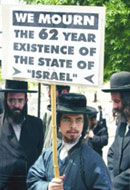 The Riddle of the Satmar
The Riddle of the SatmarThursday, February 17, 2011 by Allan Nadler | Jewish Ideas Daily » Daily Features
A prospect terrifying to secular Israelis and Zionists worldwide has been the rapid growth of the Jewish state's ultra-Orthodox (haredi) community. Given the stranglehold of haredi political parties on recent coalition governments, and the encroachments by non-Zionist haredi clerics upon Israel's chief rabbinate, once religiously moderate and firmly Zionist, the fear is not entirely irrational.
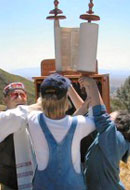 Spirituality Lite
Spirituality LiteTuesday, February 15, 2011 by Aryeh Tepper | Jewish Ideas Daily » Daily Features
A simple truth lurks behind the rise of "post-denominationalism" in Jewish religious life. It is that increasing numbers of Jews are becoming less interested in defining what Judaism means than in sampling aspects of the Jewish tradition that seem to promise spiritual vitality.
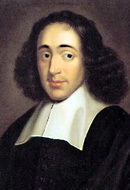 Secularism and Its Discontents
Secularism and Its DiscontentsFriday, December 17, 2010 by Yehudah Mirsky | Jewish Ideas Daily » Daily Features
The transformations of Jewish life in the last two-and-a-half centuries still boggle the mind. Deep ruptures opened to separate the present from the past, modernity from tradition, setting terms that have defined the contours of Jewish life until today. How did people try to think their way through the change?
 The Warrior Rabbi
The Warrior RabbiFriday, November 5, 2010 by Aryeh Tepper | Jewish Ideas Daily » Daily Features
Praise of military virtue, prominent in the Bible, is almost non-existent in the Talmud, which, in the aftermath of the destruction of the Temple and the exile of the Jews by the Romans, either ignores wartime feats or re-interprets them as allegories of intellectual or spiritual prowess. The Talmud's relative silence on the subject would prove enduring. Until the second half of the 20th century, with few exceptions, military virtue was consistently depreciated in traditional Jewish thought.
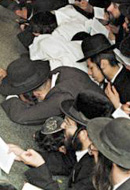 The Mad Mystic of Bratslav
The Mad Mystic of BratslavMonday, November 1, 2010 by Allan Nadler | Jewish Ideas Daily » Daily Features
Rabbi Nahman of Bratslav (1772-1811) is the strangest and most paradoxical leader in the history of Hasidism, and one of its most original, albeit mad, geniuses. Nahman has been an object of both literary fascination and considerable scholarly research. He also shares center stage with Franz Kafka (1888-1924) in Rodger Kamenetz's Burnt Books.
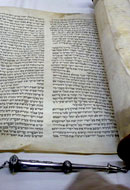 Orthodoxy and Innovation
Orthodoxy and InnovationMonday, September 13, 2010 by Aryeh Tepper | Jewish Ideas Daily » Daily Features
For many religiously observant Jews, the traditional siddur, or prayer book, constitutes a problem. One such Jew was the great hasidic rebbe, Nahman of Bratzlav (1772-1810), who articulated the problem in terms appropriate to his time: the fixed prayers, with their praises and petitions, are like a well-traveled highway, and well-traveled highways attract robbers. By which he meant that excessive routine makes it difficult to concentrate the mind.
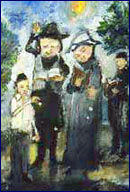 Repentance = Freedom?
Repentance = Freedom?Thursday, September 2, 2010 by Yehudah Mirsky | Jewish Ideas Daily » Daily Features
In the thick of the month of Ellul, nearing Rosh Hashanah, penitence is or should be in the air. Also recently marked was the 75th yahrzeit of the great mystic, jurist, and theologian Abraham Isaac Kook (1865-1935). As it turns out, Kook's teachings on the meaning of repentance are among his most striking, stamped with his distinctive mix of piety and audacity. In his eyes, teshuvah, generally translated as "repentance" but literally and more powerfully "return," signifies not only a deepened and renewed commitment to religion and commandments but, paradoxically, nothing less than a new birth of freedom.
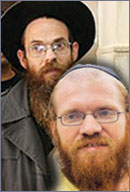 A Grim Teaching
A Grim TeachingFriday, August 27, 2010 by Yehudah Mirsky | Jewish Ideas Daily » Daily Features
Every first-year law student knows that hard cases make bad law. In Israel, a particularly hard case lies in the ongoing controversy around an inflammatory Hebrew-language volume of Jewish religious law (halakhah) that offers justifications for violent treatment of non-Jews in general and of Israel's foes in particular. The debate has highlighted longstanding divisions within Israeli society; now that the courts and the police have gotten into the act, it has also highlighted the difficulties of drawing meaningful lines between free speech and incitement.
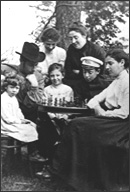 Tradition and Its Discontents
Tradition and Its DiscontentsWednesday, July 7, 2010 by Yehudah Mirsky | Jewish Ideas Daily » Daily Features
Judaism teaches the unity of body and soul. The soul has received most of the ink, but in recent decades historians have made an effort to give the body its say by uncovering and interpreting the material circumstances that, together with the learning and the spirituality, have comprised the weave of Jewish life. Prominent among these historians is the Hebrew University's Shaul Stampfer, whose new book, Families, Rabbis, and Education, explores the diverse currents coursing through the nineteenth-century Jewish heartlands of Eastern Europe.
 The Messianic Aliyah
The Messianic AliyahMonday, March 15, 2010 | Jewish Ideas Daily » Daily Features
Today marks the rededication of the Hurva (literally, "ruin") Synagogue, once the jewel in the crown of the Jewish Quarter of the Old City of Jerusalem. Its history, and the debates over that history, open a window onto a fascinating chapter with powerful reverberations today. In 1700, days after arriving from Poland, a Jewish pietist purchased an abandoned plot known since the 15th century as "the Ashkenazi courtyard," hoping to build a synagogue. When his followers proved unable to keep up their payments, the Arab creditors reduced the site to rubble. In the 19th century it arose again, magnificently, thanks to the...
Editors' Picks
The Rabbi Who Writes Too Much Gary Shapiro, Forward. Just how pronounced is the graphomania of Rabbi Eliezer Shlomo Schick? One professor found 954 titles by Schick in the catalog of the National Library of Israel—and those were just the ones in Hebrew.
Rabbinic Malpractice? Josh Yuter, Yutopia. Why did it take forty years for Orthodox Judaism to go from the "Lieberman Clause" to the strikingly similar "Halakhic Prenup"? It seems it was more concerned with delegitimizing Conservative Judaism than with addressing the agunah problem.
Darwin and the Rabbis Michael Kay, Thinking through My Fingers. We're told that "religion" and "science" went head to head over evolution. But nineteenth-century rabbis, including Samson Raphael Hirsch, Hermann Adler, and Abraham Isaac Kook, were all willing to engage with Darwinism.
Settling a Legacy Chaim Levinson, Yair Ettinger, Haaretz. As the settler movement is divided over whether to follow Zvi Yehuda Kook's theoretical refusal to cede land or his practical compromises, the young are gradually deserting religious Zionism for Hasidism.
Learning from Men Judith Hauptman, Jewish Studies Internet Journal. Were there women's voices in the ancient beit midrash? (PDF)
Hominid-Lupine Transmogrification J. Remus Bloch, Zoo Torah. Viz., metamorphosis from bipedal omnivorous hominids into lupine carnivorous canids. (Some "Purim Torah" on the werewolf)
Mourning, Melancholia, and Maimonides Jon Sommer, Zeek. Perhaps because a number of medieval Jewish philosophers were also mathematicians and astronomers, their writings on suffering offer commonsensical guidance still useful today.
Crisis of Succession Yair Ettinger, Haaretz. Yosef Shalom Elyashiv, the spiritual leader of Israel's Lithuanian Haredi community, has never chosen a successor. Now that he is critically ill, the Haredi world may soon be facing a power struggle.
Must a Jew Believe Anything? Menachem Kellner, Book of Doctrines and Opinions. According to one Maimonides scholar, dogma is a device for determining who is "out," whereas the demand of the hour is finding ways of keeping Jews "in." (Interview by Alan Brill.)
A Mask for Janus Margalit Fox, New York Times. For a generation of Reform Jews, the commentary of the recently deceased W. Gunther Plaut heralded a return to Hebrew scripture. But it also made new interpretations permissible.

